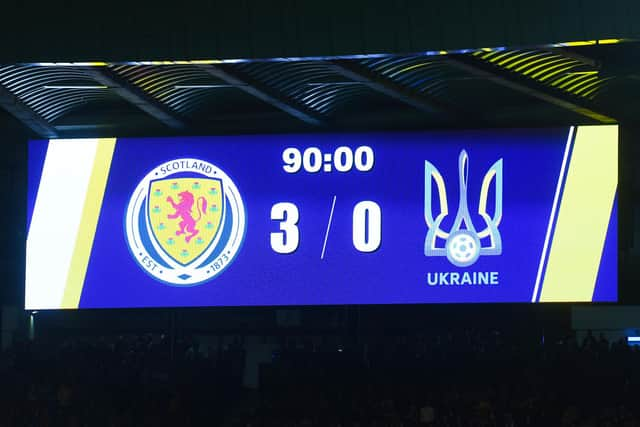5 key Scotland positives from Ukraine win - Celtic ace, Aaron Hickey, flexibility and one nagging 'what if?'
As expressed in articles in the lead up to the game at Hampden Park, emerging as group winners brings a three tier reward. Promotion to League A where some of the continent's elite wait in store is one but more importantly there will be a place in Pot 2 for the Euro 2024 qualifying and, as a back-up, a place in the play-offs for the tournament in Germany if qualification doesn’t go to plan.
There was plenty to be positive about as John McGinn opened the scoring after Scotland knocked on the Ukraine door for so long before Lyndon Dykes added a double with his head.
Flexibility of a back four
Advertisement
Hide AdAdvertisement
Hide AdWhen the team was announced there would have been plenty of quizzical looks as supporters wondered how the personnel would fit within a three-at-the-back system. Yet, for the first time in nearly three years, Steve Clarke moved away from the three and fielded a back four. Scotland have had issues in the past when Kieran Tierney was injured, namely defeats to Czech Republic at Euro 2020 and Ukraine in the World Cup play-off. Therefore it was curious that Clarke decided to make the tweak when Andy Robertson was missing – but it worked. Everyone in the defensive line looked comfortable with Jack Hendry putting in one of his best displays in a Scotland shirt. It is hugely encouraging that it is a realistic option going forward and allows the team to be more flexible, while demonstrating Clarke’s own flexibility.
Intensity
A defining feature of the second-half performance – one of the best and most dominant 45 minutes from a Scotland side against a reputable opponent in years – was the intensity and tempo, with and without the ball. Scotland penned Ukraine into their own half for periods of the opening 45 minutes but for the entirety of the second 45.
There was a moment in the first half when Che Adams pressed Mykola Matviyenko only to turn around deflated that no one was close to him to help with the press. That wasn’t the case after the interval. Scotland suffocated their opponents. Ukraine made 23 clearances to Scotland’s seven. Every time they did, the home side got the ball back and attacked again and again.


That pressure is a fantastic attacking asset but it is also an effective defensive one. It simply requires that everyone is on the same wavelength with a clear idea of what is expected of them. That was Scotland. It is there in the stats. You have to go beyond 2015 to find a match where Ukraine recorded a lower expected goals tally than their 0.08. It is 27 games – against France – since they failed to have a shot on target. The last time Scotland stopped a team from getting a shot on target was San Marino in 2019.
Open play creation
Under Clarke Scotland have been a threat from set pieces and crosses. For the first 76 minutes Scotland’s expected goals from open play was 2.44 with zero from set plays, until Scott McKenna headed over. The team were fluid, playing with pace, ingenuity and freedom. Stuart Armstrong, poor finishing aside, and Ryan Christie were excellent moving from their wide positions into dangerous central areas. John McGinn scurried about and Che Adams brought it all together as a focal point. It demonstrated another string to the country’s ever improving bow.
Of course, on comes Lyndon Dykes to knock in a couple of headers from Ryan Fraser’s corners. The duality of man. Having different avenues in which to open teams up and score is hugely encouraging.


Aaron Hickey
There was real disappointment when Nathan Patterson went down injured and had to go off injured. Even more so when it was via a stretcher. The right-back has been in great form for Everton. Yet, he’s not the only Scottish right-back impressing in the Premier League. Aaron Hickey moved for big money from Bologna to Brentford and also had a positional change from left wing-back to the right. The transition has been seamless.
On Wednesday night at Hampden Park, he looked a completely different player in a Scotland jersey compared to his previous outing against Ukraine in the World Cup play-off. The 20-year-old looks bigger, more physical and just seemed more sure of himself on the international stage. The rapid Mykhaylo Mudryk caused Scotland plenty of problems early on but Hickey came on and shut him down with ease, putting him on the back foot with forward runs of his own.
Advertisement
Hide AdAdvertisement
Hide AdScotland needn’t have to worry about the full-back positions for a number of years.
Callum McGregor
The Celtic captain gets overshadowed by team-mates in the midfield, namely Billy Gilmour and John McGinn. In the last couple of years he has become an increasingly important but understated performer and leader of the team. Not too dissimilar to Celtic where he knits an abundance of talent together in what appears to be a leisurely manner. Yet, the way he goes about his business on the park almost masks that dirty, gritty work.
No Scotland player made more recoveries or interceptions, his reading and understanding of the game is impressive. In possession he is that calming presence with a highly tuned awareness of where to direct the game. He acts as a reference point in the middle of the park. An out ball, someone who can take the ball under pressure, help out and keep it moving. He was accurate with 65 of 68 passes, the best ratio of any player to have played more than 45 minutes.
But… what if?
You came away from the game with a tinge of frustration. Of course there were different issues at play but what if Scotland had played like that in that play-off clash…
Comments
Want to join the conversation? Please or to comment on this article.